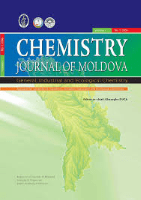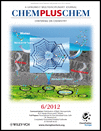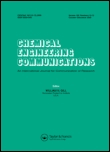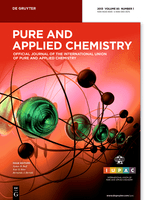
Izvestiya Vysshikh Uchebnykh Zavedenii Khimiya i Khimicheskaya Tekhnologiya
Scope & Guideline
Driving Excellence in Chemical Research and Technology
Introduction
Aims and Scopes
- Catalysis and Reaction Engineering:
Research related to catalytic processes, including the development of new catalysts, optimization of reaction conditions, and understanding reaction mechanisms. - Material Science and Nanotechnology:
Studies focused on the synthesis, characterization, and application of novel materials, particularly nanomaterials, in various fields such as electronics, energy storage, and environmental remediation. - Environmental Chemistry and Pollution Control:
Investigations into chemical processes affecting the environment, including waste treatment, pollutant degradation, and the development of eco-friendly materials. - Synthesis and Characterization of Chemical Compounds:
Original research on the synthesis of new chemical compounds, their structural characterization, and evaluation of their properties for potential applications. - Analytical Chemistry:
Development and application of analytical methods for the detection and quantification of chemical substances in various matrices, including environmental samples and biological materials.
Trending and Emerging
- Green Chemistry and Sustainable Practices:
There is a growing emphasis on research that promotes environmentally friendly chemical processes, including the use of renewable resources and the minimization of waste. - Advanced Materials for Energy Applications:
Research on new materials, particularly in energy-related fields such as batteries and fuel cells, is gaining traction as the demand for sustainable energy solutions increases. - Biochemical and Biopolymer Research:
A notable increase in studies focusing on biopolymers and biochemical processes, including enzyme catalysis and biomaterials, reflects the rising interest in biotechnology applications. - Plasma and Nanotechnology in Chemical Processes:
Emerging studies on the application of plasma technology and nanotechnology in chemical synthesis and material processing are becoming more prominent, showcasing innovative approaches to traditional problems. - Computer Modeling and Simulation in Chemistry:
Research utilizing computational methods for modeling chemical processes and materials is on the rise, underscoring the importance of theoretical frameworks in experimental chemistry.
Declining or Waning
- Classical Organic Synthesis:
There has been a noticeable reduction in papers focusing on traditional methods of organic synthesis, as the field shifts towards more innovative and sustainable approaches. - Metallic Catalysts in Traditional Processes:
Research on conventional metallic catalysts for established chemical processes has seen a decline, with a growing emphasis on alternative catalytic systems, including biocatalysts and nanocatalysts. - Conventional Polymer Chemistry:
The focus on traditional polymer synthesis and characterization has waned, as researchers increasingly explore biodegradable and environmentally friendly polymer alternatives. - Basic Physical Chemistry Studies:
Basic research in physical chemistry, such as fundamental thermodynamic studies, appears to be less frequently published, indicating a shift towards applied research with direct technological implications.
Similar Journals

Eurasian Journal of Chemistry
Advancing Global Chemistry ResearchEurasian Journal of Chemistry is an emerging open-access journal published by KARAGANDA STATE UNIVERSITY in Kazakhstan. With a focus on the diverse and dynamic field of chemistry, this journal aims to disseminate cutting-edge research and innovative findings from various branches of chemistry, engaging a global audience of researchers, professionals, and students. Despite its recent inception in 2023, the journal is strategically positioned within the field, currently ranked in the fourth quartile of Scopus for General Chemistry, indicating its potential for growth and contribution to the scientific community. The ISSN of the journal is 2959-0663 with an electronic counterpart of 2959-0671, ensuring wide accessibility to its rich content. With an open-access model, the Eurasian Journal of Chemistry promotes the sharing of knowledge and advances in research to foster collaboration and inspiration across the globe.

Chemistry Journal of Moldova
Empowering Researchers: Share, Discover, and Innovate in ChemistryChemistry Journal of Moldova is a pioneering open-access journal dedicated to fostering the dissemination of significant research in the diverse fields of chemistry, including Environmental Chemistry, Process Chemistry and Technology, and more. Published by the esteemed Academia Sciences Moldova, Institute of Chemistry, this journal has been at the forefront of scientific inquiry since its establishment in 2006. With an ISSN of 1857-1727 and a digital presence through its E-ISSN of 2345-1688, it provides an accessible platform for researchers, students, and professionals to share and engage with cutting-edge findings. Although currently ranked in the Q4 quartile in several chemistry categories, the journal is committed to improving its impact within the academic community and aims to highlight emerging trends and technologies in the chemistry domain. The journal's office is located at 3 Academiei Str, Chisinau MD-2028, Moldova. As it converges its publication years from 2016 to 2024, the Chemistry Journal of Moldova invites all contributors and readers to explore its rich repository of research that bridges innovative ideas to practical applications.

RUSSIAN CHEMICAL BULLETIN
Delivering Essential Findings for Tomorrow's Chemists.RUSSIAN CHEMICAL BULLETIN, published by SPRINGER, serves as a pivotal resource in the field of general chemistry, covering a wide array of topics that impact both theoretical and applied chemistry. With an ISSN of 1066-5285 and a presence since 1993, this journal provides a platform for disseminating significant research findings, practical applications, and novel methodologies within the broader chemistry community. While it currently holds a Q3 ranking in the Chemistry (miscellaneous) category and occupies the 230th position out of 408 in the Scopus rankings, its reputation continues to grow, fostering collaboration and innovation among researchers and professionals alike. Although the journal does not offer an open-access model, it is committed to making findings accessible within the academic community, ensuring that valuable insights can inform future research. With an anticipated convergence of studies extending to 2024, the RUSSIAN CHEMICAL BULLETIN remains an essential reference for those dedicated to advancing chemical science.

INDIAN JOURNAL OF CHEMICAL TECHNOLOGY
Empowering Scholars with Cutting-edge ResearchThe Indian Journal of Chemical Technology, published by the Natl Inst Science Communication-NISCAIR, is a pivotal platform for the dissemination of innovative research in the field of chemical technology. With an ISSN of 0971-457X and an E-ISSN of 0975-0991, this journal has been serving the academic community since its inception in 1994, and is set to continue through 2024. The journal holds a Q4 ranking in both the Chemical Engineering and Chemistry categories as of 2023, though it showcases a significant breadth of research, making it a valuable resource for both emerging and established scholars. Although it currently operates without an open-access model, the journal aims to facilitate knowledge exchange through rigorous peer-reviewed publications, allowing researchers and professionals to stay updated with the latest advancements and practices in chemical technology. Located in New Delhi, India, the journal not only contributes to national scientific dialogue but also plays a key role in the global conversation around chemical sciences by addressing unique challenges and innovations pertinent to the region.

JOURNAL OF THE INDIAN CHEMICAL SOCIETY
Bridging Academia and Industry in the Chemical RealmJournal of the Indian Chemical Society, published by Elsevier, stands as a cornerstone in the field of chemistry, particularly representing the rich chemical research emanating from India.
With a significant history dating back to its establishment, this journal encompasses diverse disciplines including Drug Discovery, Electrochemistry, Inorganic Chemistry, Organic Chemistry, and Physical and Theoretical Chemistry, reflecting the evolving landscape of chemical sciences.
Despite being positioned in the Q3 category across multiple quarters, the journal demonstrates promising rankings in various chemistries, highlighting its commitment to advancing the knowledge and application of chemical sciences. While currently not available as an open access journal, the Journal of the Indian Chemical Society is dedicated to providing a platform for high-quality research that fosters innovation and collaboration among researchers, professionals, and students worldwide.
With its continuous publication from 1973 to the present, it serves as an essential repository for cutting-edge findings and developments in chemistry, striving to connect academia with industry and practice.

Solid Fuel Chemistry
Exploring Breakthroughs in Fuel TechnologySolid Fuel Chemistry is a pivotal journal published by PLEIADES PUBLISHING INC, dedicated to advancing knowledge in the fields of chemical engineering, chemistry, and fuel technology. With its ISSN 0361-5219 and E-ISSN 1934-8029, this esteemed publication has been contributing to the scientific community since its inception, covering extensive research from 1975 to 2024. Operating within the Q3 and Q4 quartiles, it holds a significant position among peers in its categories, ranked 94th in Energy & Fuel Technology and 212th in General Chemical Engineering. Although it lacks an open access option, the journal remains a vital resource for researchers, professionals, and students eager to explore innovative developments in solid fuels and their applications. The articles published in Solid Fuel Chemistry provide essential insights, facilitate collaboration, and inspire further research, making it an indispensable platform for anyone engaged in this essential field of study.

AFINIDAD
Fostering Collaboration in Chemical Sciences Since 1996.AFINIDAD is a distinguished academic journal published by the Assoc Antics Alumnes Inst Quimic Sarria - AIQS in Spain, focusing on the fields of Chemical Engineering and Chemistry. Since its inception in 1996, this journal has served as a platform for the dissemination of innovative research, current developments, and significant findings in these disciplines, thus facilitating knowledge sharing among researchers, professionals, and students. While currently categorized as Q4 in both Chemical Engineering and Chemistry as per the 2023 quartiles, AFINIDAD is committed to promoting quality scholarship that may contribute to the advancement of these fields. With a Scopus ranking placing it among the broader categories in Chemical Engineering and General Chemistry, this journal represents an essential resource for academic and industrial practitioners seeking to stay abreast of emerging trends and methodologies. Moreover, the absence of an open access option encourages institutions and individuals to invest in their academic growth through subscription-based access. Located in the vibrant city of Barcelona, AFINIDAD continues to uphold its mission to foster a collaborative and informative environment for the scientific community.

ChemPlusChem
Unlocking the Future of Chemistry, One Article at a TimeChemPlusChem is a premier journal published by WILEY-V C H VERLAG GMBH, dedicated to the vibrant field of chemistry. With an ISSN of 2192-6506 and an impressive Q1 ranking in Scopus's 2023 category for miscellaneous chemistry, this journal serves as a significant platform for the dissemination of high-quality research and innovative findings. Since its inception in 2012, ChemPlusChem has fostered interdisciplinary collaborations, encapsulating a wide array of topics within chemistry that facilitate scientific advancement and education. The journal features a robust open access system, enabling extensive visibility for authors while providing easy-to-access resources for researchers, professionals, and students globally. Located in Weinheim, Germany, ChemPlusChem reflects international standards and ambitions, striving to enrich the global scientific community through rigorous research and engaging scientific discourse.

CHEMICAL ENGINEERING COMMUNICATIONS
Unveiling Innovations in Chemical Engineering.Chemical Engineering Communications, published by Taylor & Francis Inc, is a distinguished journal within the realms of Chemical Engineering and Chemistry. With an ISSN of 0098-6445, this journal plays a pivotal role in disseminating innovative research, critical reviews, and insightful discussions that encompass a broad spectrum of topics in these fields. The journal boasts a commendable Q2 ranking in the 2023 category of chemical engineering and general chemistry, reflecting its significant contribution to the scientific community. Operating under a rigorous peer-review process, the journal attracts high-quality submissions from global researchers. Although currently not an Open Access journal, it provides extensive archive access for users interested in exploring past advancements from its inception in 1973 through to 2024. With a commitment to advancing knowledge and fostering collaboration among academia and industry, Chemical Engineering Communications remains an essential resource for professionals and students aiming to stay abreast of the latest developments in chemical sciences.

PURE AND APPLIED CHEMISTRY
Exploring Innovations in Chemical EngineeringPURE AND APPLIED CHEMISTRY is a highly regarded journal in the fields of chemical engineering and general chemistry, published by Walter de Gruyter GmbH. Since its inception in 1960, this journal has continued to foster advancements in chemical research and facilitate the dissemination of new knowledge through its rigorous peer-reviewed articles. With an impressive impact factor that places it in Q2 quartile rankings for both Chemical Engineering and Chemistry as of 2023, it holds a significant position in the academic landscape, attracting authors and contributors from around the globe. The journal’s unique focus on the practical applications of chemical research makes it indispensable for researchers, professionals, and students aiming to bridge theoretical knowledge with real-world applications. Although it is not open access, its impact is enhanced by its continued relevance and contributions to the ever-evolving field of chemistry. Researchers and practitioners alike will find in PURE AND APPLIED CHEMISTRY a critical resource for staying updated on key developments and innovative practices in chemistry and chemical engineering.